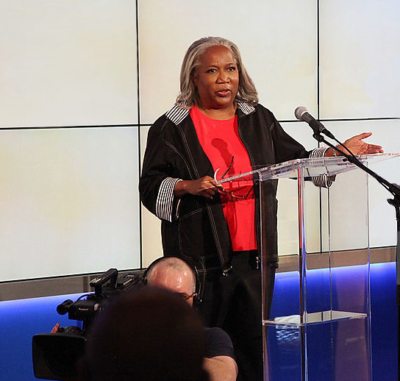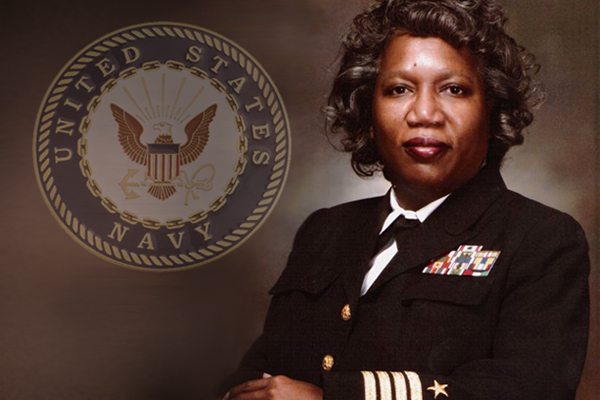Lima Charlie News proudly welcomes Captain Gail Harris, the newest Veteran Correspondent to its Editorial Team
Captain Gail Harris’ trailblazing firsts in the US Navy are paralleled only by her enduring presence as a role model and inspiration to service members, veterans and civilians alike. It is with great honor that we introduce Gail to our readers and offer a spotlight on her esteemed accomplishments during her naval and post-naval career.
After a long and distinguished career, Capt. Gail Harris retired in 2001, the highest-ranking African American female officer in the US Navy. Having forged a path for women and men in the armed services, her legacy includes numerous pioneering firsts.
In 1973, Gail broke a 200-year-old tradition as the first female—in a squad of 360 men—to become Intelligence Officer in a Navy operational aviation squadron. She became the first woman in Naval history to serve in a Navy job classified as combat. In 1979, Gail became the first female and African American instructor at the Armed Forces Air Intelligence Training Center, at Lowry Air Force Base in Colorado. There, at the height of the Cold War, Gail built up the US Navy’s first course on Ocean Surveillance Information Systems and taught Anti-Submarine Warfare and Soviet Surface Operations courses.
“We were in the profession because we were called and believed in the importance of what we were doing, not for the glory.”
In 1984, she was one of the first two women assigned to the Office of Naval Intelligence’s War Gaming Team Detachment at the Naval War College. She was chosen twice to be Commander of the Soviet Union’s Theater military forces during the Global War Games. She was requested, by name, to coordinate the Defense Department’s Intelligence support at the 1988 Olympics, in Seoul, South Korea.
In 1989, she became the first female and African American to lead the Intelligence Department for Fleet Air Reconnaissance Squadron Two, the US Navy’s largest Aviation Squadron. The mission was for the Squadron to support US military and aircraft carrier operations with Intelligence reports during the Gulf War.
From 1992 through 1996 Capt. Harris served in the Middle East as the Intelligence Planner for the Commander of US Naval Forces Central Command (NAVCENT), where she also headed the US Navy’s Iraqi Crisis Action Cell and Intelligence Watch Center during crisis operations in the Persian Gulf. She was chosen by the Director of Naval Intelligence and Commander of NAVCENT to fill in as Acting Naval Attaché, Egypt, for a five-month period, becoming the first female attaché to a Middle Eastern country.
Capt. Harris would go on to lead at the forefront of one of the Department of Defense’s newest challenges, Cyber Warfare. She served as Department of Defense Lead spearheading innovative policy for the evolving threat of computer network defense, where her solutions and advice would be adopted by more than 30 government agencies and military commands.
A “joint intelligence warrior extraordinaire,” Capt. Harris had excelled as Deputy Director of the Joint Intelligence Center (JIC), US Strategic Command, where she was responsible for day to day operations and managed multimillion-dollar budgets and more than 500 men and women in the production of intelligence information. She even earned commendation by the Joint Staff for her “masterful” work in intelligence while backing 300+ Allied Force targets in Kosovo. Capt. Harris acknowledges “God was using each assignment to broaden my education and prepare me for the job ahead.”
“My job is to provide the best information possible so that the warfighter can do his job. My sex or race has no bearing on the work situation. For many years I had a sign on my desk paraphrasing a Thomas Paine quote: ‘Lead, follow, or get the hell out of my way'”
Capt. Harris’ naval career mirrors a lifetime of academic achievement. After successfully completing a degree at Drew University in Madison, New Jersey, she received an academic scholarship to attend graduate school at the University of Denver’s School of International Studies. She took the advice of close family and friends and began her studies there but, as she said, “my heart wasn’t really in it. I was tired of studying history, I was ready to go out and start making it.” Indeed, the rest is history.
From the moment she commenced her naval career, Gail Harris had to survive on the merits of her ability and mental acumen. She refused to be just a symbol for what many might have seen as government forcing unwanted changes in the Navy.
While at Officer Candidate School, the Navy had officially opened up intelligence training to women, leaving one spot available for her class. Gail was chosen for the class because of her intellectual gains from her additional year in graduate school. On the very first day of class, as the instructor navigated around the room and asked each student what assignment they aimed to pursue after graduation, Gail, the sole female in her class, expressed interest in joining an aviation squadron. While her instructor scoffed at her request, derisively predicting she would end up at a desk job in Washington D.C., Gail set to work to forge a way forward. She did her research to find a way around the legal restrictions preventing women from joining aviation squadrons, and found that the Air Force was allowing women intelligence graduates to join aviation squadrons. Equipped with her signature resolve and the facts to back it up, she marched back into the classroom and never relinquished her persistence.
Gail held firm to her convictions, all the way up the chain of command, and the Naval Intelligence Training School eventually made her the test case for female intelligence officers in operational squadrons. Elated and prepared to get to work, she knew she had to be more than just an icon of female empowerment for other women in the Navy. The intelligence community needed her to succeed intellectually in her patrol aviation squadron, so that future squadrons would be willing to accept females.
An enormous responsibility was placed squarely on Harris’ shoulders. As the best and the brightest amongst her peers—both male and female—Gail won her respect even from those who initially disliked her. She also learned that her keen sense of humor would serve her well in her new position. When an enlisted sailor refused to salute her, she would respond with a cheerful “Good morning!”, breaking protocol and saluting them first, much to their embarrassment.
This is America. You can be whatever you want.
– James Harris
“This dream within me was no mere passing fancy, as those around me would soon discover. The road that led to my career in naval intelligence is a living example of the principle: dream a dream, make a wish, and say a prayer.”
Long before she indelibly changed the landscape of naval history, Gail Harris’ pioneering achievements began with a “Wing and a Prayer.” At the tender age of five, a young Gail watched a 1944 black-and-white film, starring actor Don Ameche, who played Bingo Harper, flight commander aboard the aircraft carrier USS Enterprise. The film “Wing and a Prayer,” followed a heroic crew in the early days of WWII, in the aftermath of Pearl Harbor. As Gail watched Commander Harper deliver an intelligence briefing to the brave pilots aboard the Enterprise, a dream grew within her, and she proudly announced to her father, “Daddy that’s what I’m going to do when I grow up.” Gail’s father, who had served his country in the segregated Army forces in the aftermath of WWII, chose not to kill her dream by informing her of the odds against it. As she recounts today, her father—a man ahead of his time—voiced his thoughts with a smile, offering “This is America. You can be whatever you want.” As she reminds us, she owes all of the success of her journey to her parents, James and Lena Harris—her spiritual advisor—and her strong faith in God.
Growing up, as she began experiencing the trials and tribulations of life, her father reinforced the principle that there were two things you could do about any problem: something or nothing. As she recollects, he had no patience for any whining about being treated differently in a male-dominated workplace. This served her well as she, too, adopted, and lived by, the same philosophy.
“The most important professional moment for me happened during my first assignment at one of my lowest points.”
During her first assignment, Gail quickly realized that while her squadron’s senior officers wanted the bragging rights of having the first female intelligence officer, they didn’t expect her to actually do anything. To them, as a woman, she was unqualified. As a result, she was destined to remain an assistant intelligence officer, instead of moving up to a senior position, for two and a half years, instead of one.
At one point, while awaiting a well-earned promotion in her P-3C squadron, a new commanding officer came into the department. He informed her that no matter what, she would not be promoted and, instead, would be moved to the administrative department, adding she should consider herself lucky and stop complaining. Although the naval intelligence community supported her and offered to file charges on her behalf against him, Gail held true to her convictions—those instilled in her by her father. She declined to file a report and reminded herself that it didn’t matter what anyone said or thought about her—she would work to become one of the best intelligence officers in history.
But nothing in life comes easy. One day, after locking herself in her office, in the midst of crying, she heard a knock at the door. Wiping tears, she answered. Standing outside was a grizzled Navy Chief who announced, “Ma’am, me and the other Chiefs have been talking. We wanted to let you know we think you’re the best Junior Officer in the squadron.” He smiled. As most sailors can attest to, the Navy is run by admirals and chiefs. This moment would give Gail the foundation upon which to continue her mission.
You don’t know this today, but you are the most famous woman in Cairo!
During the Gulf War, after advancing to become the first female and African American to lead the Intelligence Department for Fleet Air Reconnaissance Squadron Two, Capt. Harris would continue to spend a great deal of time in the Middle East and Persian Gulf. Apart from serving as Intelligence Planner for the Commander of NAVCENT, heading the Navy’s Iraqi Crisis Action Cell, and the Intelligence Watch Center, Harris would be chosen as the first female attaché in a Middle Eastern country.
The Naval Attaché to Egypt had unexpectedly retired, leaving a 5 month gap before his relief was scheduled to arrive. Senior officials scrambled to find someone to temporarily fill a job that normally required two years of training. Appointed by the Director of Naval Intelligence and Commander of NAVCENT, Harris served as Acting Naval Attaché, Egypt, for a five-month period. In Egypt, although many warned her that military men wouldn’t deal well with a female, she remarked that she had never been treated better or with more courtesy and respect. On her very first day, one of the senior officials at the Egyptian Ministry of Defense told her, “You don’t know this today but you are the most famous woman in Cairo!”
“Warfighters have a saying that on the first day of war, the original plan is already outdated. I’ve found that on the first day of a war or crisis, the intelligence plan and intelligence architecture is out-of-date as well.”
Capt. Harris’ 28-year career in the Navy would include hands-on leadership in the intelligence community during every major conflict from the Cold War, to El Salvador, to Desert Storm, to Kosovo. As a staff member for the Naval War College’s war-gaming tour, she “learned to think like the bad guys,” and was selected to provide expertise in developing a viable maritime strategy for the 21st century.
Given that the US had been locked in a Cold War with Russia for the majority of Harris’ career, the information she skillfully deciphered often meant the difference between life and death. She reminds us, “When giving an intelligence brief to people who are going to go in harm’s way, they didn’t care what color I was or if I was attractive or if my uniform didn’t look right. They cared what came out of my mouth.” Harris adds, “I have a warrior mentality. In order to provide intelligence support to wars and crises you have to be strong mentally. You know if you don’t do your job correctly someone can die. That takes the mindset of what I call an intellectual warrior.”
Among Captain Harris’ honorable accolades are 3 Navy Commendation Medals, the Kuwaiti Liberation Medal, 2 Navy Battle “E” Ribbons, the Pistol Marksman Ribbons, 2 Sea Service Deployment Ribbons, 2 Defense Superior Service Medals and the Southwest Asia Service Medal with the bronze star. On this topic, Gail notes that she is most proud of her two Battle E ribbons, awards given annually by the Navy to the best combat units.
“Focus on winning the war, not just waging war.”
As Harris reached the twenty-year retirement mark, she knew she would be coming up for promotion to captain soon. Though she was coping with various medical factors that impacted her physical health, she remained steadfast to her ever-present mantra: “What really mattered was whether I could meet the intellectual challenge of being a professional Navy intelligence officer. I knew my mind and spirit were strong enough to achieve my goal and win.”
Once again, Gail put her intellect to the test, determined to push past any physical obstacles in her way to qualify for captain. As time went by, she even aimed to hold herself to the male physical standards to pass her physical fitness tests. After lifestyle changes and rigorous training, she passed the test with flying colors. But this was not enough. Challenging herself farther, she went on to hike the infamous Inca Trail in Peru, a quest that would take her over the Andes Mountains, more than 12,000 feet above sea level.
The promotion board met to review the candidates, and Gail was selected as captain, making her the highest-ranking African American female in the Navy at the time of her retirement. At the time, her father, from whom she garners her strength and deep resolve, was losing his battle with lung cancer. While she didn’t make it home in time to see him, she received her captain’s eagles at his funeral. Gail offers, “Goodbye, Daddy, thank you for seeing me through and helping me to win my private war.”
Capt. Harris would soon retire. “Like a professional athlete, a professional warrior’s career is limited. My goal as I approached retirement was to leave the Navy at a time of my choosing under honorable conditions.”
One team, One fight.
As a pioneer in the course of military history, Gail remains, at once, humble and a torchbearer—a rare combination. Her story reminds us that achievement runs deeper than surface attributes, ethnic categories, and physical labels. Instead, her success is carried forward on a foundation of intellectual merit and unwavering mental perseverance. She blazed the trails she encountered on skill and intellect. “Outstanding job performance,” she notes, “trumps criticism.”
Capt. Harris told us, “I proudly stand on the shoulders of all those military women who came before me.” She cited examples of Deborah Sampson, who fought in the Revolutionary War disguised as a man, Dr. Mary Walker, who served in the Civil War openly as a lieutenant in the Medical Corp, and Harriet Tubman, the first woman to officially lead an armed expedition in war. Harris added, “Most defense analysts will say Desert Storm was the defining moment for women in combat. But it was an incremental process starting with women serving officially in both World Wars. It was not a government “social experiment”—women were needed.”
 Gail offers that she would like her legacy to be: “One team, One fight.” As she says, “it doesn’t matter what color you are. If you can do the job, you’re part of the team. The military is a calling. My attitude is: I may disagree with what you say or your political views but I will defend your right to say it with my life.” As for Capt. Harris’ place in the history of US Naval intelligence, “I was the first woman in Naval history assigned to a navy combat squadron as an intelligence officer. You’ve never heard of me because it worked, and the guys accepted me.”
Gail offers that she would like her legacy to be: “One team, One fight.” As she says, “it doesn’t matter what color you are. If you can do the job, you’re part of the team. The military is a calling. My attitude is: I may disagree with what you say or your political views but I will defend your right to say it with my life.” As for Capt. Harris’ place in the history of US Naval intelligence, “I was the first woman in Naval history assigned to a navy combat squadron as an intelligence officer. You’ve never heard of me because it worked, and the guys accepted me.”
When asked what advice she would give to the next generation of intelligence professionals, she said, “I would say persevere…move forward with honor, courage, and commitment. In the words of Winston Churchill, “Never, never, never, give up.”
“Second star to the right then straight on till morning”
One year after her retirement, Lockheed Martin offered Captain Harris a job assisting in designing a follow-on aircraft for both the EP-3 and the P-3C. After completing the project successfully, she realized that her real passion did not lie in the corporate world. Gail then made plans to pursue one of her true loves: music.
“Music is my great love,” she reminded us. While in the Navy, during her assignment in Spain, she had volunteered as a DJ for the Armed Forces Radio and TV Network. It all started one night at a restaurant, when the manager of the network walked into the room. Gail yelled, “Hey! The music on your radio station sucks. Sucks big time!” He yelled back, “Well Miss Smarty Pants, if you know so much, why don’t you come in and help us out!” The rest was history. Gail’s radio show would go on to become not just a hit for military types, but also the Spaniards, particularly the teenagers. During a July 4th celebration, a group of Spanish fans heard Gail was nearby and immediately started yelling and jumping up and down, as though she was a rock star.
Shortly after she moved to Durango 10 years ago, Capt. Harris would continue to pursue her passion for music, taking a leap of faith and signing with local KDUR radio station. Today, at the age of 67, Gail now has one of the most popular shows in town. Fire and Rain, plays on KDUR 91.9 on Wednesdays at 6 PM. The name stems from her take on R&B music, which is “about the highs and lows of romantic love,” as she describes.
“I play the best of yesterday and today’s R&B. I play a lot of Luther Vandross, Earth Wind and Fire, Chaka Khan, Aretha Franklin and even sneak in some Frank Sinatra (my favorite singer).” DJ Harris adds, “I also tend to share some of my misadventures during the show, especially about my bike rides, a favorite activity of mine since childhood.”
Drawing from her experience as an intelligence expert, since her retirement Gail continues to write for multiple publications, both print and digital, including the Foreign Policy Association, as a Defense Blogger. Gail is also a Senior Fellow with the Truman National Security Project and a Senior Fellow for the George Washington University Center for Cyber and Homeland Security. She is also author of A Woman’s War: The Professional and Personal Journey of the Navy’s First African American Female Intelligence Officer.
Although she currently resides in Durango, Colorado, Gail’s address at heart reads, second star to the right, then straight on till morning.
As Gail embarks on yet another chapter in her post-naval professional career, she will be taking up a column on Lima Charlie News’ online publication. Her topics of focus will range from national security, to defense, to cyber warfare.
“Lima Charlie’s core mission is to train veterans and active service members to be journalists, to empower them and provide a forum for their unique insight and perspective,” said Anthony A. LoPresti, Lima Charlie News’ Editor-in-Chief. “Capt. Harris is truly a shining light, an inspiration to our team to meet and achieve that mission.”
Lima Charlie Senior Correspondent, US Army veteran Don Martinez has witnessed firsthand the wealth of experience that Captain Harris brings to any environment of which she is a part. Don and Gail have most recently crossed paths in their esteemed positions at the Truman National Security Project.
“Gail brings a wealth of knowledge and wisdom to Lima Charlie’s team of Veteran Correspondents,” Don said. “She is a consummate national security expert who brings her experience both in and out of uniform to the Lima Charlie community, as well as their readers. Gail is a perfect example of how effectively military veterans can continue to provide insight on current events around the world through the eyes of someone who has real life experience on the ground.”
The Lima Charlie Team could not be more proud to welcome Capt. Harris aboard. Please stay tuned for her upcoming column, “GailForce”.
Lima Charlie News, with Extra Special Ops by Nikita Roach
Lima Charlie provides global news, insight and analysis by military veterans and service members Worldwide.
Please follow us on Twitter at @LimaCharlieNews
#LimaCharlie #LimaCharlieNews
[Internal Image: Rob Kim]





![Israel-Hamas Cyberwar, when old warfare meets new [Lima Charlie News]](https://limacharlienews.com/wp-content/uploads/2019/05/Israel-Hamas-cyber-warfare-01-e1558501438770-480x384.jpg)
![Image Huawei – China’s telecom giant hits a giant wall [Lima Charlie News]](https://limacharlienews.com/wp-content/uploads/2019/01/Huawei-–-China’s-telecom-giant-hits-a-giant-wall-480x384.png)
![Image U.S. 'Space Force' looking more and more like space reality [Lima Charlie News]](https://limacharlienews.com/wp-content/uploads/2018/08/Space-Force-looking-more-and-more-like-space-reality-480x384.png)
![Image GailForce: Blinking Red - Cyber War and Malign Influence Operations Today [Lima Charlie News][Graphic: Lima Charlie News]](https://limacharlienews.com/wp-content/uploads/2018/08/GailForce-Blinking-Red-Cyber-War-and-Malign-Influence-Operations-Today-Lima-Charlie-News-01-480x384.png)


Dear Gail : I read, with interest,your list of achievements and I am indeed favourably impressed.When I knew you in Hawaii I remember you as being self effacing which I always thought as one of the better character traits a person can have.My father always said that if a person is confident and feels good about themselves and is mentally and emotionally healthy they don’t talk about themselves.This you Gail.I still live in Hawaii and after I saw you last in the early 90’s I’ve made 3 trips around the world ,the first one taking a year.Shoot me an email.I’d like to play catch up. It’s been a long time.John Bigelow Honolulu,Hawaii